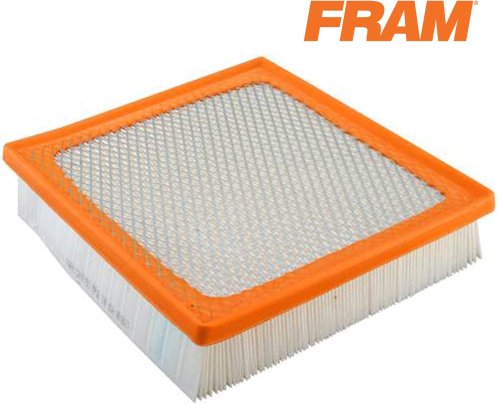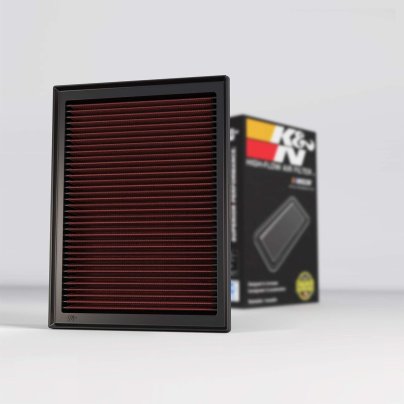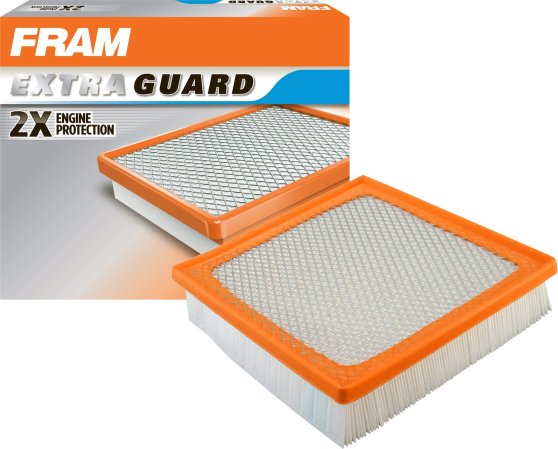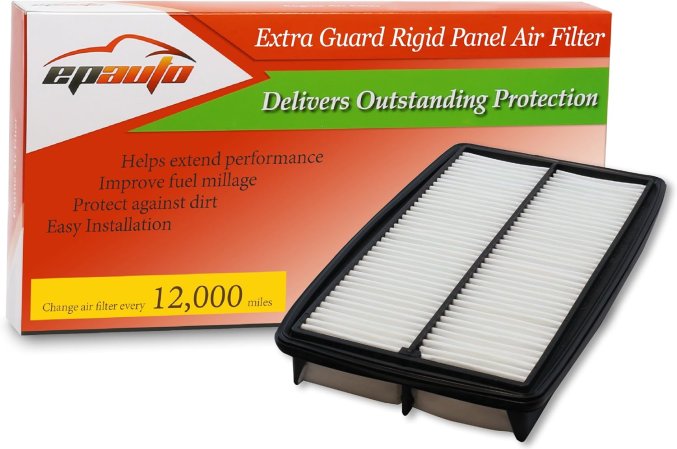We may earn revenue from the products available on this page and participate in affiliate programs. Learn more ›

Engine maintenance is critical if you want your vehicle to perform at its best. One way to ensure it’s operating efficiently is by cleaning and/or replacing all the necessary components. This includes the engine’s air filter. The best engine air filters will protect your vehicle from dirt and debris. Check our car air filter guide to find the best products on the market for your Toyota, Honda, Volkswagen, and other types of vehicles. And, for those of you who are curious about whether or not an aftermarket filter makes more horsepower, check out the dyno testing we did with multiple different filter types.
Summary List
- Best Overall: FRAM Extra Guard Flexible Rectangular Panel Air Filter
- Best Value: EPAuto GP013 Extra Guard Rigid Panel Engine Air Filter
- Honorable Mention: K&N Oiled Air Filter
- Safest Choice: ACDelco GM OE Air Filter
Our Methodology
This is The Drive. Our collective experience with cars is pretty impressive. Over the years, the staff has accumulated a wealth of information on all things cars, and air filters are among the many things we’re experts on. Again, we’ve even done dyno testing to compare different filters and determine which deliver the best performance. That said, this list combines our experience with plenty of research to ensure we’ve got something for everyone. Keep in mind that the air filters shown below are each attached to a specific make and model, but are a representation of what’s available for various vehicles. If the filter below isn’t a direct match to your car but you like what it brings to the table, simply look for the same series by the same brand for your vehicle.
Best Engine Air Filters Reviews & Recommendations
Best Overall: FRAM Extra Guard Flexible Rectangular Panel Air Filter
Pros
- OEM quality and filtration that fits just like stock.
- Wide variety of fitments for most vehicles.
Cons
- Although this is likely less expensive than the factory filter, it is still disposable and will need to be replaced just as often.
The FRAM filter provides two-times normal protection by improving airflow and preventing dirt and dust from entering the engine. The product comes with directions and illustrations that provide clear installation instructions. To prevent decreased acceleration and horsepower and improve overall performance, the company recommends changing the filter every 12,000 miles.
This filter is excellent quality, easy to install (it takes less than five minutes), and it doesn’t require any special tools or mechanical skills. It works great, is reliable, and fits perfectly in compatible vehicles. It is significantly cheaper to install yourself versus taking your vehicle to a dealership for service. Also, the orange border allows you to write the install date and mileage on it for future reference.
There have been some comments that this is a tighter fit than your OEM filter, so it may be harder to insert. It seems a bit thicker than the original filter, so you may need to push down a bit on the cover to attach the clips or use pliers to pull the locking tab into place on the cover.
Best Value: EPAuto GP013 Extra Guard Rigid Panel Engine Air Filter
Pros
- Claims to have more surface area than most comparable factory filters.
- In most cases, this is a thrid of the price you would pay at a dealership.
Cons
- Higher-flowing filter material may not filter as well.
- A few filters may not seal as tightly in the airbox as factory.
For a budget-friendly pick that still delivers great filtering performance, consider the EPAuto GP013Extra Guard Rigid Panel Engine Air Filter. This particular model is designed to fit ideally with Acura MDX model years 2007-2009, Honda Pilot 2009-2015, and Honda Odyssey 2005-2010. It’s meant to replace your Honda or Acura OEM air filter, but features more pleats than the OEM filter, hopefully removing more debris and contaminants.
Particles as small as dust, pollen, sand, and even soot are no problem for this filter. It’s also designed to help improve your fuel mileage when replaced every 12,000 miles. This economical filter is meant to be a comparable option that can easily compete with more expensive filters, like FRAM.
One downside seems to be that the actual filter material seems slightly more porous than the Honda and Acura OEM filters, causing some concern over the long-term degree of filtration. Also, some users report that the filter doesn’t fit as exactly and tightly as their OEM filter.
Honorable Mention: K&N Oiled Air Filter
Pros
- The biggest advantage here is that it is washable and more environmentally friendly.
- For some particulates, the oiled filter is more likely to capture debris.
Cons
- High initial cost compared to aftermarket paper filters.
- Some laboratory tests have shown higher pressure drop as face velocity increases.
This washable and reusable oil filter is claimed to boost horsepower. It can be used again and again and has high airflow with exceptional filtration. It lasts up to 50,000 miles before cleaning is required, depending on driving conditions.
Some users have claimed, after installing this high-quality filter in your vehicle, it seems to breathe a bit better, and your vehicle doesn’t feel restricted or choked up like it can with a stock filter. Plus, you may experience a slight bump in acceleration and MPG. It’s a one-time purchase because it lasts the lifespan of your car, and it improves the health and performance of your engine.
Safest Choice: ACDelco GM OE Air Filter
Pros
- Our own dyno testing has shown that a stock air filter is the best compromise between performance and cost.
- This is guaranteed to fit your factory airbox perfectly.
Cons
- You probably can save a few bucks buying something not a name brand.
- Although it is a paper filter, you will have to cut it up if you want to recycle it.
When it comes time to replace your GM engine air filter, you can’t go wrong with the ACDelco GM Original Equipment Air Filter. This filter is engineered and tested to some of the most rigorous standards in the automotive industry to ensure top-notch performance and reliability. It will not only enhance your engine’s performance, but also maximize its efficiency to help extend your engine life.
This filter, like most engine air filters, traps even the smallest particles before it reaches the engine, providing you with the cleanest air possible. It’s equipped with a durable and tight seal around the filter paper to prevent any unfiltered air from entering the combustion chamber.
This particular air filter has been validated by GM engineers to be constructed from OE parts for your Chevrolet, Buick, Cadillac, or GMC vehicle. That, coupled with its super affordable price point, makes it difficult for us to find anything we don’t like about this air filter.
Our Verdict
When it comes to our top pick for the best overall engine air filter, it’s got to be the FRAM Extra Guard Flexible Rectangular Panel Air Filter. This high-quality and dependable air filter is super easy to install and provides a secure and tight fit that will protect your engine and limit wear.
If you’re looking for a budget-friendly model that will still provide excellent protection and performance, try the EPAuto GP013 Extra Guard Rigid Panel Engine Air Filter.
Types of Engine Air Filters
Paper
There’s a good chance your vehicle came with this type of filter, which is the most common on the market. The best paper air filter is not very expensive, and it does an adequate job of filtering your engine. Paper filters typically need to be replaced every 15,000 to 30,000 miles, depending on where you drive. For example, if you frequently traverse dirt roads or live in a polluted area, you will have to replace it more often.
Reusable
Performance filters are usually custom-fit based on your vehicle’s model and make. The best high-performance air filters are reusable as long as they are properly cleaned. These replacement air filters are designed to open up your engine to its fullest potential by increasing horsepower and fuel economy. While they are superior to paper filters, they are also more expensive.
Oil
This type of air filter is coated in oil. It traps dirt and debris and prevents it from passing through the oiled layer. An oiled filter provides more clean engine performance than other types of filters, and it is also reusable. These replacement filters require occasional cleaning and re-oiling but should last the lifespan of your vehicle.
Key Features
Compatibility
It’s essential that you make an automotive air filter comparison to ensure that the product you select is designed for your vehicle’s make and model. You may simply use the stock size filter that comes with your car or truck. If you modify your engine, i.e., add a turbo or supercharger, you will need a performance filter. These are often cone-shaped and are referred to as cold air intakes or induction kits.
Durability
Pay attention to the overall construction of the air filter. This includes the material used in the construction of the product. Look at the filter and see if it will hold up under general wear and tear. Good air filter brands will be made of high-quality materials and be longer-lasting.
Surface Area
The best engine air filters have more grooves in their designs. This allows them to trap more contaminants. Air filters with flatter surface areas are less effective in filtering out dirt and debris. If you want the best air filter replacement, find one with multiple pleats or folds.
FAQs
Q: How often do I need to change my engine’s air filter?
A: If you have a paper filter, experts recommend changing it every 15,000 to 30,000 miles or every three years. Over time they will start to degrade. If you have a performance filter, you may be able to go as long as 50,000 or even more before you have to clean it.
Q: What are the signs that I need to change my air filter?
A: You may need to replace your engine’s air filter if you notice weaker acceleration, decreased throttle control, and ignition problems. You may also notice reduced gas mileage or horsepower. If the service light kicks on or black smoke comes out of the exhaust, you may need a new air filter.
Q: How do I change an engine air filter?
A: First, open your hood and find the air filter housing, which is next to the engine. Remove the old filter, and throw it away if it’s paper. If it’s a performance filter, clean it off and re-oil it, if required. Then insert the new or cleaned filter. If you want to replace a paper filter with a performance filter, make sure it’s compatible with your vehicle.







